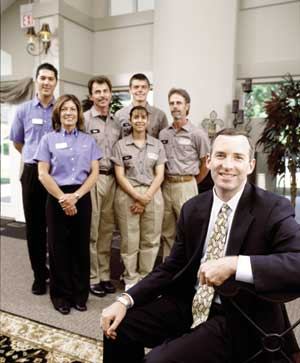Scaling for the Future But Laramar’s embrace of technology and employee empowerment can create Catch-22s. After teaching and encouraging his employees to make pricing decisions, Woodward expects one day to move Laramar to a computerized pricing system, which would limit or eliminate many of the unit-specific revenue management decisions his property managers currently enjoy making. But the CEO says these employees will get new opportunities to practice their property management skills. “If we go to these systems, we can empower them to do other things,” he says. “They can focus on customer service or think creatively about generating revenue.”
The other challenge may be even bigger. Taking advantage of the extraordinarily hot market for multifamily transactions, Laramar was a net seller of properties in the past year, a trend it expects to continue for at least the next 12 months. While selling properties at low cap rates pays off handsomely for Woodward, Elowe, and their investors, it presents a thorny issue when dealing with employees who have embraced the Laramar system. “We built a rock-solid foundation that will be around for a while, but how do you communicate that when the reality is we are going to sell some assets and people will lose their jobs?” Woodward asks. “It’s absolutely the right thing to do, but that doesn’t always translate to the service technician, who I have to sit in front of to tell that we’re selling his property and that he may be losing his job.”
To address such issues, Laramar often aims to get the best of both worlds for the company and its employees by trying to convince the property purchaser to keep Laramar on as a fee property manager. The company, which expects to become a property buyer again once acquisition costs cool off, also may try to stash key employees in special jobs temporarily if their property is sold, keeping them and their expertise with Laramar.
But as Laramar pushes forward, Woodward remains confident that he has built the systems and workforce to handle a drop or jump in units. “The underlying systems and process are there whether you have 15,000 units or 50,000 units,” he says. “We are fully scalable. It wouldn’t be easy, but we could double in size in the next six months.”
Embracing Complication While operations may be the Laramar Group’s forte, it’s not the Chicago-based company’s only strength. Laramar has developed quite a reputation for being able to execute complicated deals that other companies can’t handle.
“We love complicated financing structures or an undermanaged asset,” says Dave Woodward, Laramar’s managing partner and CEO. “We have done enough bond deals that we’re familiar with the rating agencies and reporting requirements.”
Laramar can also handle costly rehabs. Exhibit A may be Whitehall Manor in the Chicago suburb of Mundelein. The class D, garden-style property was an eyesore in the otherwise upper-middle-class neighborhood. Poorly maintained, the property had many basement units that were uninhabitable because of flood damage.
The renter profile was even worse: Whitehall Manor had become a haven for local gangs. While others saw decay, Woodward saw potential. After a year of negotiations, Laramar bought the 522-unit property in 2003, which is now being gutted and rebuilt at a cost of about $25,000 per unit. When the first rebuilt units opened their doors in June, it was a B property aimed at the middle class. Once the units and clubhouse are complete in the fourth quarter of this year, the property will be renamed The Park Butterfield.
For Jennifer Steans, president of Chicago-based Financial Investments Corp., partnering with Laramar on such deals is a no-brainer. “They can handle incredibly complex transactions,” she says. “They can take a complex set of issues and distill it to the key strategy they need to implement to make that property successful. They can get very focused on that strategy and execute against it very, very well.”
Even when things get chancy, “I don’t mind taking risks with them,” Steans says. “There’s a huge value-added play, and we can get huge returns if they execute.”
Laramar Group at a Glance
- Founded: 1989
- Headquarters: Chicago
- Apartment Units: 15,000 (25 percent are fee-managed)
- Apartment Units in the Pipeline: 2,000 units
- Geographic Coverage: Arizona, California, Colorado, Florida, Illinois, Kansas, Minnesota, Missouri, New Jersey, Pennsylvania, Texas, Washington
- Employees: 400
